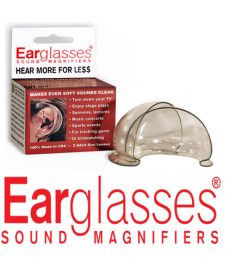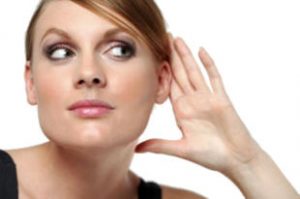A recent Time magazine cover article about “mindfulness” made me pause for mindful reflection. “Can mindfulness improve how much we can hear,” I wondered. And soon I concluded, “yes, but only if you keep the right attitudes in mind.”
I once trained myself to become an expert listener. That practice gave me good reason to see that the right mindset can open doors to new and more subtle perceptions. My experiences in designing and improving my Earglasses® Sound Magnifiers invention reinforced that conclusion.
I formed my first company to market my product using the corporate name “The Listening Institute.” The name reflected the inspiration for the product. The idea for ear-focused acoustic lenses came to me because I was a serious audiophile. I even wrote for a small audio review magazine for a while. I worked hard to be able to discriminate between the sounds produced by one audio component versus another. Attentive listening for subtle audible details was critical, as was the need to develop descriptions for the differences I noted.
Basically, my experience reminded me that “listening” is very different than “hearing.” Hearing is latent, a sensory capability. But for that sensory apparatus to work, one must listen. What’s the difference? Listening is a product of combining hearing with concentrated attention — or “mindfulness,” as Time puts it.
It’s just like our mothers’ told us: “listen to me! Pay attention!“
I’d like to add a few further observations about how to make that process work at its best.
Whenever I have trouble hearing something that interests me these days, the first things I experience are: (1) anxiety about what I may be missing; (2) a temptation to deny my interest in the sounds that confuse me, so that I don’t have to work at increasing my attention; and (3) fear that my senses are declining with age, and that I may look foolish or weak as a result.
All of these negative feelings result in even more confusion and annoyance until I either turn my attention elsewhere or my brain somehow figures out how to better hear what I had been missing. Let’s focus on this second outcome and see if there are ways we can increase the odds of arriving at such a result.
How does our consciousness puzzle out the solution to mysteries contained in sounds at the outer limits of perception? I have no idea. But I do know from experience that if I maintain a calm, empty but attentive mindfulness while listening to sounds that at first cause me confusion, I will be able understand them sooner than if I panic and start to indulge in a fearful interior retreat.
I call the process “hyperlistening.” Hyperlistening calls for keeping an open, uncluttered mind. It requires one to stay confident of the mind’s ability to solve problems when calm, patient attention is paid to the source of one’s former confusion.
As my own hyperlistening skills advanced, I became capable of doing things that sound engineers considered impossible. I became able to reliably identify the differences in the sound envelopes produced by audio amplifiers with identical electrical profiles. When listening to well-engineered recordings, I became able to identify the location of individual members of a performing ensemble. I could pin down not only their position on my stereo’s auditory stage on a left-to-right basis, but could even determine whether their position was toward the front or rear of the recording venue. The size of the venue, even the qualities of its furnishings (“wet” or “dry,” depending on the degree of reverberation) became matters I learned to hear, and to reliably articulate.
If you too experience the kinds of hearing anxieties I noted above, try sharpening your own hyperlistening skills. You can do that by using your own audio system. Even the sound system in your automobile can provide you with challenges that can help you to sharpen your senses. Practice may not make perfect, but it can help, to a surprising degree.

